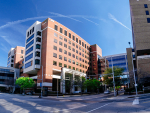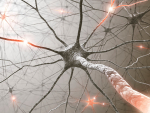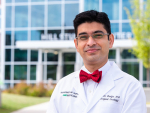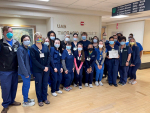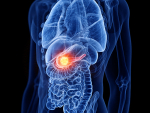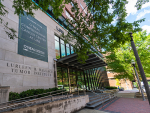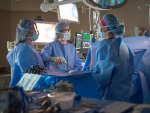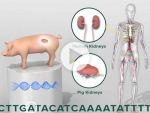Displaying items by tag: department of surgery
For one UAB employee, having a nephew compete in The World Games makes Birmingham’s and UAB’s support of the games come full circle.
Tagged under
The device will be used to treat patients with symptomatic severe aortic stenosis who are at high or extreme risk for open-heart surgery.
Tagged under
UAB experts highlight the social determinants of obesity and add to the growing body of evidence identifying potential solutions to address obesity and related conditions.
Tagged under
Alyson Haynes beat breast cancer through her determination and a strong support system at the O’Neal Comprehensive Cancer Center at UAB.
Tagged under
A UAB physician-turned-patient reflects on her journey to healing and recovery from breast cancer for National Cancer Survivors Day.
Tagged under
Anyone traveling more than four hours by air, car or bus can be at risk for blood clots. The director of the UAB Vein Center provides tips on how to prevent blood clots when traveling.
Tagged under
The drug inhibits the kinase Cdk5, found in mature neurons. Cdk5 has long been implicated in neuropsychiatric and neurodegenerative conditions, but previous inhibitors have largely failed to reach the brain through the blood-brain barrier.
Tagged under
UAB’s Vikas Dudeja will serve as the principal investigator for a $2 million grant to continue research on liver cancer.
Tagged under
The grant program funds early-career faculty to advance their skills and careers across campus and beyond.
Tagged under
- release
- college of arts and sciences
- office of the provost for student and faculty success
- school of medicine
- department of medicine
- department of physics
- department of biology
- school of engineering
- department of civil construction and environmental engineering
- school of health professions
- department of clinical and diagnostic sciences
- school of nursing
- department of music
- department of surgery
- department of radiation oncology
- department of neurosurgery
- division of genomics and bioinformatics
- division of pulmonary allergy and critical care medicine
- department of sociology
- department of family and community medicine
- department of criminal justice
- department of chemistry
Pirfenidone shows promise as treatment for acute pancreatitis in therapeutic settings, according to new study.
Tagged under
The Pancreatobiliary Disease Center treats diseases of the pancreas and bile ducts with a personalized and multidisciplinary approach.
Tagged under
During the past half-century, the UAB Comprehensive Transplant Institute has pioneered many changes, including groundbreaking research, new medicines and innovative techniques.
Tagged under
Tagged under
Join UAB in bringing awareness of colorectal cancer through various resources and tips for the community.
Tagged under
Although combination chemotherapy with radiation has been the standard of care for treating rectal cancer for more than 20 years, very little is known about why some tumors are more resistant to this treatment than others.
Tagged under
With news about UAB’s first peer-reviewed, published transplant of genetically modified pig kidneys into a brain-dead human individual, there are many questions about what this means for the future of transplant and how this will save countless lives moving forward.
Tagged under
UAB physicians are working on the next steps to begin compassionate or emergency use of the pig kidneys in living humans. Two major approvals will be required.
Tagged under

